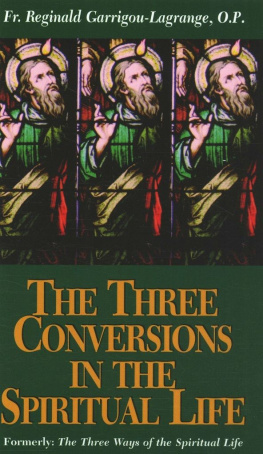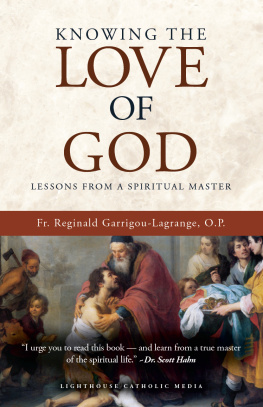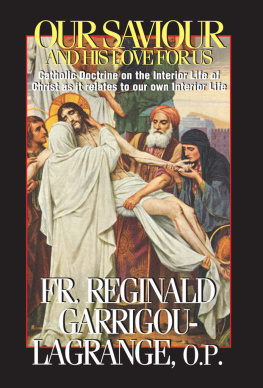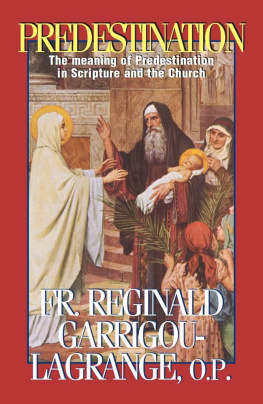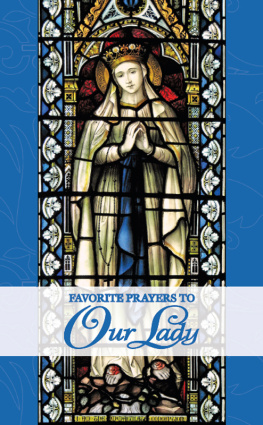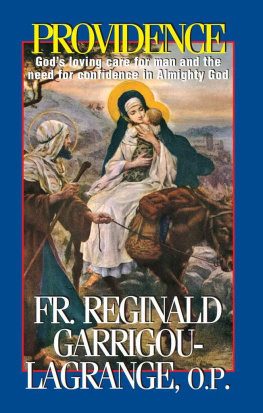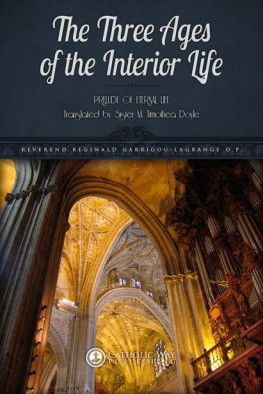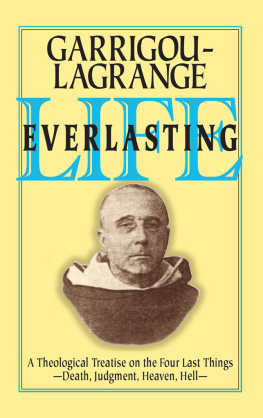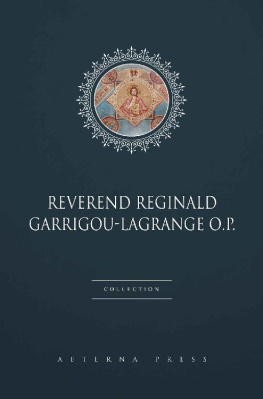The Three Conversions in the Spiritual Life
Fr. Reginald Garrigou-Lagrange, O.P.
NIHIL OBSTAT Eduardus Can. Mahoney, S.T.D.
Censor deputatus
IMPRIMATUR Leonellus Can. Evans
Vic. Gen.
Westmonasterii,
die 4a Maii 1938
Copyright 1938 by Burns Oates & Washbourne Ltd. All rights reserved. Originally published in 1938 by Burns Oates & Washbourne, London, as The Three Ways of the Spiritual Life.
Cover illustration: Detail of "Pentecost" stained-glass window. Photo Alan Brown 1993, Bardstown, KY. Cover design: Pete Massari, Rockford, IL.
TAN Books
Charlotte, North Carolina
www.TANBooks.com
2015
"We have seen that the transformation of the Apostles on the day of Pentecost was like a third conversion for them. There must be something similar in the life of every Christian, if he is to pass from the way of proficients to that of the perfect. Here, says St. John of the Cross, there must be a radical purgation of the spirit, just as there had to be a purgation of the senses in order to pass from the way of beginners to that of proficients, commonly called the illuminative way. And just as the first conversion, by which we turn away from the world to begin to walk in the way of God, presupposes acts of faith, hope, charity and contrition, so it is also with the other two conversions. But here the acts of the theological virtues are much more profound: God, who makes us perform these acts, drives the furrow in our souls in the same direction, but much more deeply." (Page 58).
Contents
Translator's Note
THE TRANSLATOR makes grateful acknowledgement of Mr. Allison Peers' permission to use his translation of the works of St. John of the Cross,
Foreword
THIS LITTLE book, presented in a form accessible to all spiritual souls, is in reality a synopsis of two larger works, which, however, it is not necessary to have read in order easily to understand what we have written here.
In Perfection chrtienne et contemplation we showed that, according to the principles formulated by St. Thomas and by St. John of the Cross, Christian perfection consists especially in charity, in the perfect fulfilment of the two great commandments: "Thou shalt love the Lord thy God with thy whole heart and with thy whole soul and with all thy strength and with all thy mind; and thy neighbour as thyself." (Luke 10:27). In the same work it was seen that the infused contemplation of the mysteries of faiththe Trinity present within us, the redemptive Incarnation, the Cross, the Eucharistis in the normal way of sanctity
Following the same principles we have treated elsewhere of the purgations necessary in order to attain to the perfect love of God and one's neighbour; showing in particular that the passive purgation of the senses marks entrance into the illuminative way, and that the purgation of the spirit marks entrance into the unitive way of the perfect.
Requests have reached us from several quarters for a brief outline of these two works, to set in clear relief the main principles of ascetical and mystical theology. We have not wished, however, simply to repeat what we had written elsewhere. Accordingly we intend to consider the whole subject from a point of view which is at once more simple and more sublime, and to speak here of the three periods of the spiritual life, and in particular of the three conversions which constitute the beginning of each.
A first chapter deals with the life of grace and the importance of the first conversion. Succeeding chapters treat of progress in the spiritual life, with special emphasis upon the other two conversions or transformations which mark the beginnings of the illuminative and the unitive ways respectively.
The division of spiritual progress according to the three ways, commonly accepted since St. Augustine and Dionysius, has become hackneyed, being reproduced invariably in all treatises on spirituality. But its profound truth, its meaning, its bearing, its vital interest, become apparent when it is explained by analogy with the periods of our physical life, and alsoa point which is often forgottenby comparison with the stages in the spiritual development of the Apostles. The Apostles owed their formation immediately to our Lord Himself, and their interior life ought, according to the teaching of the saints, to be proportionately reproduced in us. They are our models; especially they are models for the priest. And every Christian ought in a sense to be an apostle, and so to live the life of Christ as to be able to communicate it to others.
The greatest emphasis in this book will be laid upon elementary truths. But we are apt to forget that the most sublime and most vital truths are precisely elementary truths, deeply studied, prayerfully considered and made the object of supernatural contemplation.
Many persons familiar with the Gospel, if asked the question: "Does the Gospel anywhere mention the second conversion?" would probably answer in the negative. And yet our Lord makes a very clear statement on the subject. St. Mark relates (9:32) that when Jesus had arrived at Capharnaum on His last journey to Galilee He asked them: What did you treat of in the way? "But they held their peace," the Evangelist tells us, "for in the way they had disputed among themselves which of them should be greatest." And in the Gospel of St. Matthew (18:2), where the same event is described, we read: "Jesus, calling unto him a little child, set him in the midst of them, and said: Amen I say to you, unless you be converted and become as little children you shall not enter into the kingdom of heaven." Is this not an obvious reference to the second conversion? Jesus is speaking to the Apostles who have followed Him, who have shared His ministry, who are to receive Communion at the Last Supper, three of whom have followed Him up to Thabor. They are in the state of grace, and yet He speaks to them of the need of a second conversion, if they are to enter far into the kingdom of heaven or into the divine intimacy. And to Peter in particular it was said: "Simon, Simon, behold Satan hath desired to have you, that he may sift you as wheat. But I have prayed for thee, that thy faith fail not; and thou, being once converted, confirm thy brethren." (Luke 22:31). This is a reference to the second conversion of Peter, which will take place at the end of the Passion, immediately after his denial.
It is to the second conversion that the greater part of this book will be devoted.
CHAPTER I
The Life of Grace and the Importance Of the First Conversion
THE INTERIOR life is for all the one thing necessary. It ought to be constantly developing in our souls; more so than what we call our intellectual life, more so than our scientific, artistic or literary life. The interior life is lived in the depths of the soul; it is the life of the whole man, not merely of one or other of his faculties. And our intellectual life would gain immeasurably by appreciating this; it would receive an inestimable advantage if, instead of attempting to supplant the spiritual life, it recognized its necessity and importance, and welcomed its beneficial influencethe influence of the theological virtues and the gifts of the Holy Ghost. How deeply important our subject is may be seen in the very words we have used: Intellectuality and Spirituality. And it is important to us not only as individuals, but also in our social relations; for it is evident that we can exert no real or profound influence upon our fellowmen unless we live a truly interior life ourselves.
The Necessity of the Interior Life
The pressing need of devoting ourselves to the consideration of the one thing necessary is especially manifest in these days of general chaos and unrest, when so many men and nations, neglecting their true destiny, give themselves up entirely to acquiring earthly possessions, failing to realize how inferior these are to the everlasting riches of the spirit.
Next page
